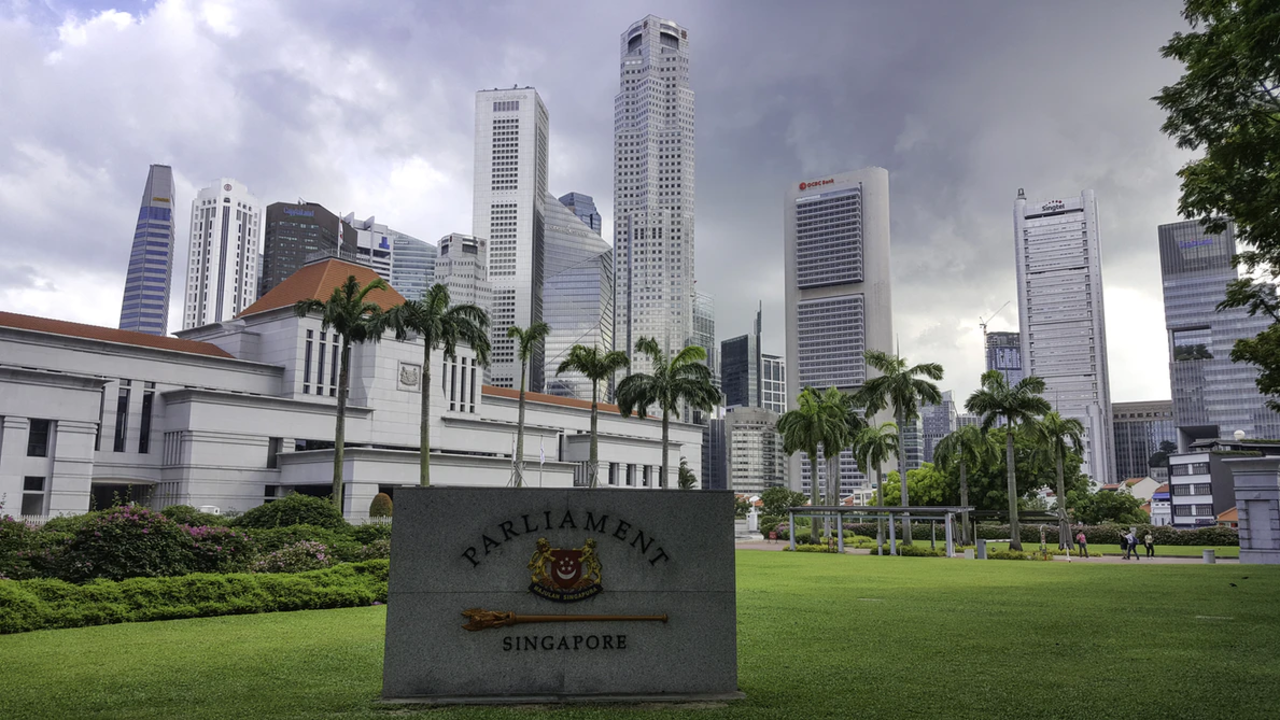Top image: Steven Lasry/Unsplash
If Singapore had a LinkedIn page, ‘straight as an arrow’ would probably be at the top of our bio. In 2019, we were the 4th least corrupt of 180 countries on Transparency International’s Corruption Perceptions Index, and 3rd out of 180 for absence of corruption on the World Justice Project’s Rule of Law Index.
Lee Kwan Yew was famously militant that no public official should be above the law. In keeping with his legacy, our politicians’ reputation for being whiter than white has largely endured till today—a rarity in a world where concern, suspicion, and anger around corporate influence on politics is growing, along with the belief that there is one system for elites, and another for everyone else.
In such an environment, the lack of public information around MPs’ financial interests—or, at the very least, difficulties in accessing such information— is striking.
It’s well known that full-time MPs are a minority, and most hold day jobs or juggle external roles like company directorships. Despite this, it can be surprisingly challenging to find out what your MP does when they’re not in Parliament, and what other interests they might be beholden to.
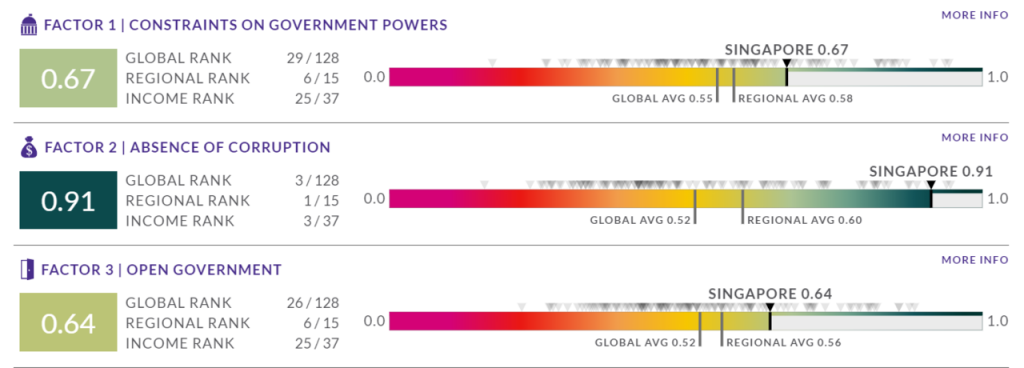
Down The Rabbit Hole
As a topic, MPs’ private interests have always hovered somewhere in our peripheral vision: never quite in the foreground, but with just enough presence to keep the public eye flickering back every so often.
When it crops up, as it does every now and then, it tends to be over how many directorships MPs hold. Most recently, during GE 2020, MP Tan See Leng was forced to clarify that he only held four directorships and not 69, as the social media rumour mill claimed.
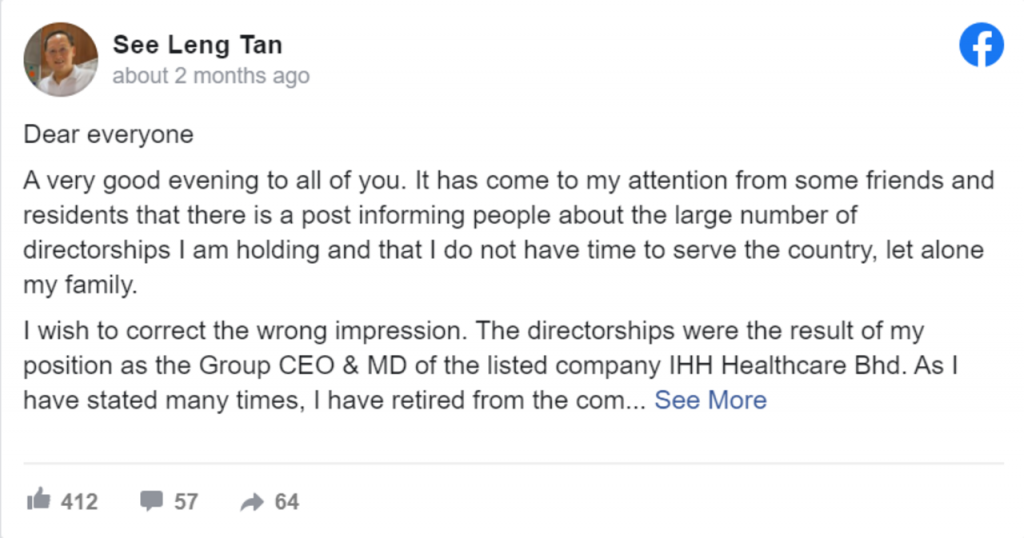
But obsessing over how many other hats an MP wears, and whether these take away from their time and energy for public service, misses the forest for the trees. Of greater concern is whether those private interests could come into conflict with their performance of their public duties.
Conflicts of interest are like porn: easy to recognise, but difficult to regulate. Avoiding them altogether can be almost impossible, whether in the private or public sector; more important is whether sufficient checks exist to ensure they’re not taken advantage of. This, however, requires knowing what those interests are in the first place.
In Singapore, politicians are currently subject to various disclosure requirements and safeguards. All of these are fairly extensive. The problem is that they’re also either internal, lack legal enforceability, or yield information in too piecemeal a fashion for anyone to keep track of.
In short, unless you are an extremely dogged and politically engaged citizen with a lot of free time (or a masochistic journalist running on caffeine), there is no easy or efficient way to find out what boards your MP sits on, or what other groups they serve besides their constituents.
My starting point for trying to determine this was the Parliament website, where MPs can publish their CVs. However, this is optional: many do not. Moreover, even where provided, the detail and scope of CVs vary.
MP Cheryl Chan, for example, provides an extensive bullet-point list of her jobs and fiduciary responsibilities, which reflect her involvement in the Linde Group, an MNC in the chemical industry.
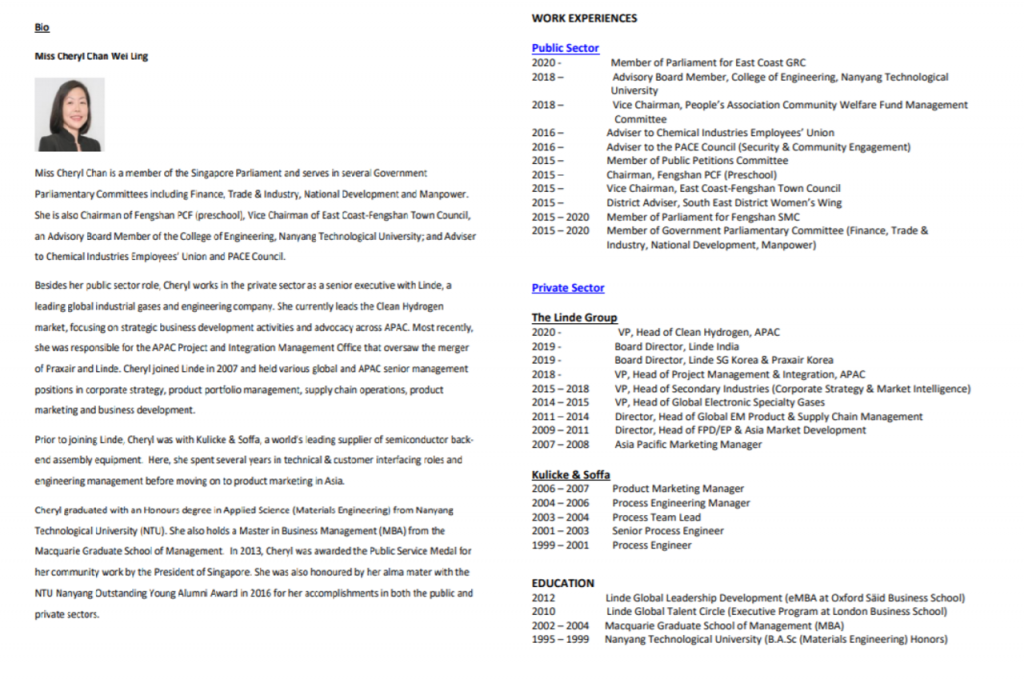
However, she appeared to be in the minority. I looked through the bios of around 30 backbench MPs across the different parties for this piece, and found that while most provide a few paragraphs sketching out their employment history, education, and hobbies, few make their fiduciary responsibilities explicit.
Anything further depends on your curiosity, patience, and skill with Google. Short of asking your MP directly, your only other options are to 1) comb through Hansard, or 2) cobble together whatever you can glean from company reports, LinkedIn, and newspaper articles. Neither guarantees to yield anything except a headache.
As an experiment, I tried looking up MP Sitoh Yih Pin, whom a 2011 article cited as having six directorships as of that year (the most of the sitting MPs featured in that piece). Curiously, his Parliamentary bio is a two-sentence affair, but his Wikipedia page contains a list of his directorships over the years, four of which are supposedly active at present.
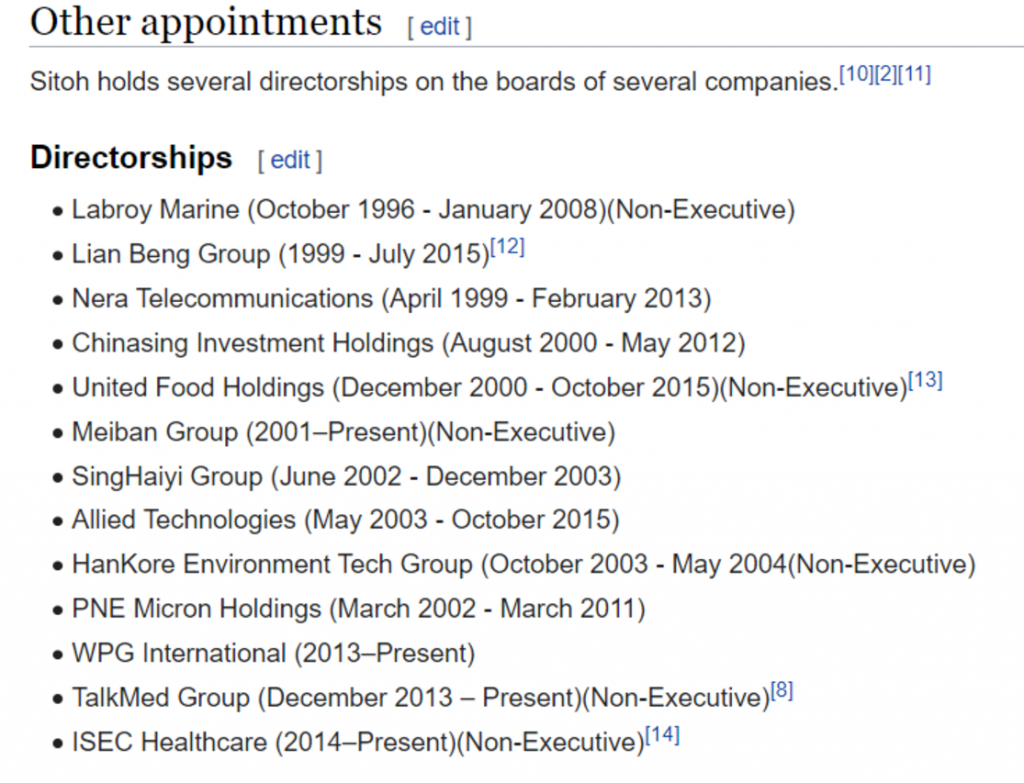
I tried looking these up individually, taking the list at face value. Two of the four were easy enough: the companies published their boards on their websites. But the third hit a wall, as it doesn’t, and I couldn’t find an up-to-date annual report. The only way to get your hands on a copy is to fork out $5.50 and buy a copy off ACRA.
The fourth company’s website, meanwhile, lists its board of directors online, but Mr Sitoh’s name wasn’t among them. When I went back to Wiki to look for a citation, there wasn’t one. At this point, I gave up and went to make another coffee.

Existing measures
To paraphrase Trevor Noah, accountability relies on a few things: clarity over what the rules are, institutions to help enforce them, confidence that they are enforced fairly, and transparency—the information to help ascertain this. It’s in the last category that Singapore’s existing mechanisms fall short.
The primary check on MPs is Section 32 of the Parliament (Privileges, Immunities, and Powers) Act. It regulates conflicts of interest by requiring MPs to declare any direct personal pecuniary interests in a matter before they can discuss it in Parliament, and prohibits them from voting on matters which they have such an interest in. Contravening this can lead to a fine of up to $5,000, two years’ imprisonment, or both. [1]
I don’t doubt that our MPs take the law seriously, and do their utmost to exercise their judgement honourably and responsibly. But equally, I don’t doubt that they are human, which is to say they do not exist in some vacuum, magically sealed off from all external influence or private interest.
Unfortunately, there’s little way to tell what these might be at present: the information, while technically available, is hardly accessible. Writing in the Straits Times in 2005, Dr. Gillian Koh of the Institute for Policy Studies commented that, the ‘Singapore premium’ of integrity and incorruptibility notwithstanding, “it would take the efforts of a ‘super citizen’ or organizations to make the undisclosed links between decisions and private interests.”
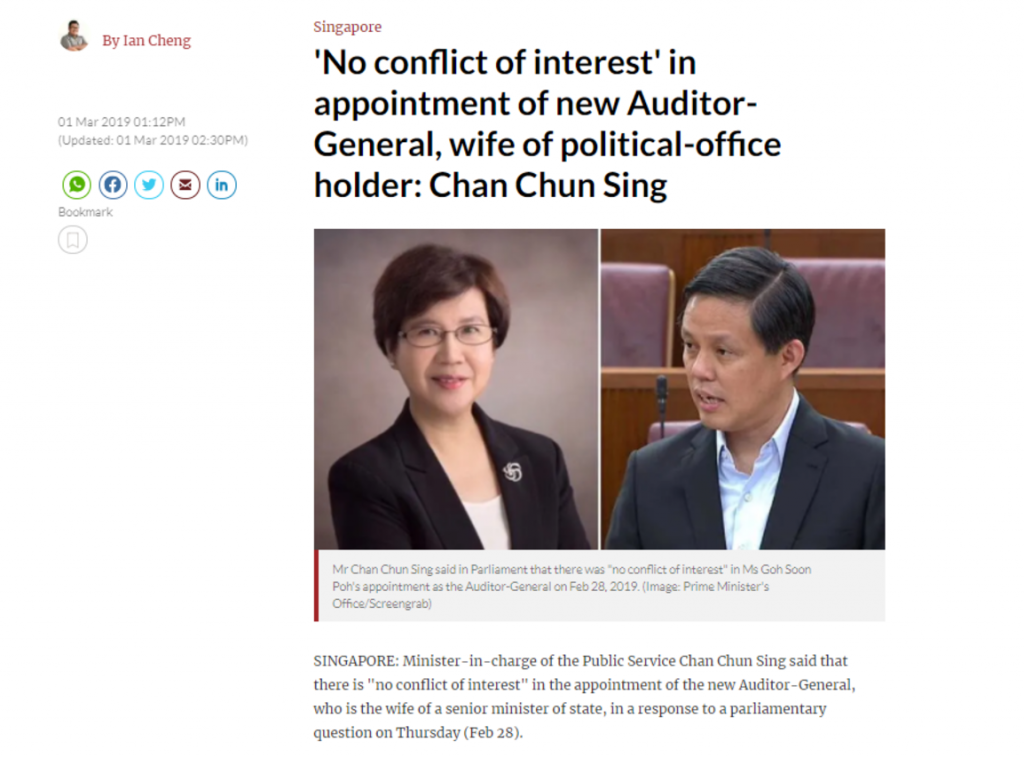
Meanwhile, Ministers, Parliamentary Secretaries, and Ministers of State (and in some cases, their families) are bound by the Ministerial Code of Conduct.
Under the Code, Ministers are generally prohibited from holding company directorships, and must give these up before they can take office. They must also disclose their sources of income, assets, and financial liabilities, and cannot accept gifts except in a strictly personal capacity.
“It is vital”, it states, “that Ministers do not by their conduct undermine public confidence in themselves or bring discredit to the Government … A Minister must scrupulously avoid any actual or apparent conflict of interest between his office and his private financial interests.”
The catch is that its scope is internal. Disclosure under the Code is made to the President, via the Prime Minister, in confidence. And significantly, compliance is a matter of Ministers’ personal responsibility and discretion.
The Code does not specify any penalties for breach. Moreover, it explicitly states that “any issue concerning compliance or non-compliance with it is not subject to review by any court or tribunal”.
The final layer is intra-party disclosure. Famously, the PAP’s Rules of Prudence, issued by the Prime Minister at the start of every new Parliamentary term, lay out the party’s extensive expectations of its MPs. (I reached out to the WP and PSP to clarify their internal disclosure requirements, but did not receive a response.)
Prudence, as dictated by the Rules, is a tedious mistress. All PAP MPs must disclose their—deep breath—directorships, business and professional interests, latest employment and monthly pay, all retainers and fees, and whether their job requires them to correspond with Government Ministries or statutory boards on behalf of employers or clients to the head of the party.
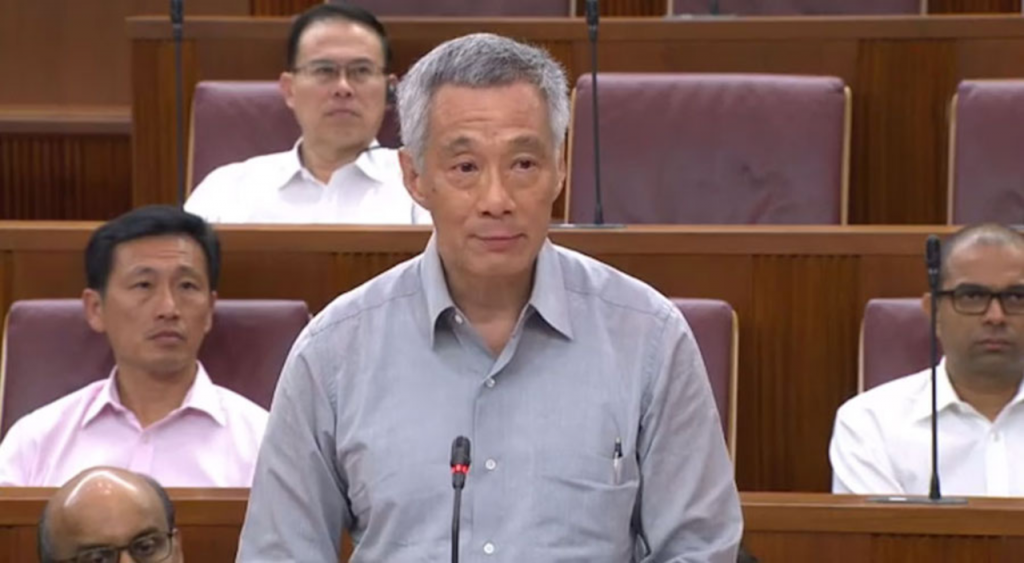
The Rules cover much more than disclosure, and are an interesting read in their own right. They make clear that the PAP still sets much store by LKY’s gospel of scrupulous propriety— not just because it has willingly imposed this duty on its own MPs, but also because, as the Rules rightfully acknowledge, public trust is such a precious asset.
Nonetheless, the Rules are only that: rules, not law, and the litany of declarations they demand remain for the PM’s eyes only.
The Case For a Public Register
A 2010 study of 175 countries’ financial and conflict disclosure regimes found a strong correlation between good governance and public disclosure. Significantly, the authors found that “… secret disclosure, even if extensive, is not systematically related to better government.”
In any case, you don’t need to have studied Political Science 101 to understand that ownself-check-ownself is useless. As such, the main arguments for public disclosure of MPs’ interests are—hopefully—fairly evident: it would encourage public confidence in decision-making, support the greater transparency required of politicians, strengthen Singapore’s zero-tolerance reputation towards corruption, and affirm the role of accountability in our social contract.
The old adage about sunshine being the best disinfectant might be cliched, but it’s got a point. After all, anger around the encroachment of corporate influence on politics got Donald Trump elected, at least in part, on promises to ‘drain the swamp’.
Or take the recent case of domestic worker Parti Liyani, which set the internet playing connect-the-dots across Singapore’s elite after she was acquitted of stealing from her employer, Changi Airport Group chairman Liew Mun Leong.

In the weeks since her acquittal, Parti’s quest to clear her name has become more than a David-and-Goliath tale of justice prevailing against the odds. The egregious lapses in the conduct of the case, and the Liews’ position amidst the uppermost echelons of Singapore society, have prompted questions over whether their privilege made the odds even greater—and stoked fears that greater bias and double-standards are afoot.
Wherever you are, the pattern is clear: resentment leads to suspicion, suspicion to speculation, and speculation to anti-establishment sentiment of the sort which made Nigel Farage a household name in the UK.
The populist genie, once out of the bottle, can rarely be put back. But it could be forestalled, at least in part, by creating an independently maintained, publicly accessible register of MPs’ financial interests (including NCMPs and NMPs), updated on a regular basis.

I reached out to around 30 backbench MPs from the three political parties in Parliament, including NCMPs, to ask for their thoughts on this. Most did not respond, and one declined to comment. [2]
The only MP to respond in the affirmative, NCMP Hazel Poa, said she was in favour of such a register as it would encourage greater transparency. “This will allow [MPs’] words and actions to be viewed in context and help build trust and confidence in our system,” she said.
Former NMP Anthea Ong echoed Ms. Poa’s sentiments about strengthening public trust.
“We are also slowly but surely seeing more diverse representation in Parliament, so it would seem prudent as a maturing parliamentary democracy to have such a register to remind MPs to be more intentional about declaring their direct interests, instead of merely relying on individual political parties’ code of conduct for their members in this regard,” she added.
This works to MPs’ benefit, too, as showing their cards at the outset would protect them from accusations of hiding conflicts of interest. (In the past, several MPs have recused themselves from positions to avoid exactly this.) Implicit in any disclosure regime is the understanding that avoiding the appearance of bias is just as important as avoiding actual bias itself.
“[I]n the social media world that we’re in, where there is growing scepticism of elites, it would make sense for public figures to take pro-active and pre-emptive control of their own narratives by being as upfront about their circumstances as possible,” Professor Kenneth Paul Tan of the Lee Kuan Yew School of Public Policy, told me over email.
“Otherwise, they can become easy targets and even victims of suspicion, speculation, and disinformation, which—even if totally untrue— will be very difficult to dispel completely.”
To see his point, one need only recall the firestorm which erupted when a netizen accused Minister of Manpower Josephine Teo of profiteering and corruption, in relation to her husband’s then-role as the Chief Executive (International) of Surbana Jurong.
Although the allegations were disproven and the netizen withdrew his claims, whispers resurfaced when it was announced that Mr. Teo would be leaving the role earlier this month.
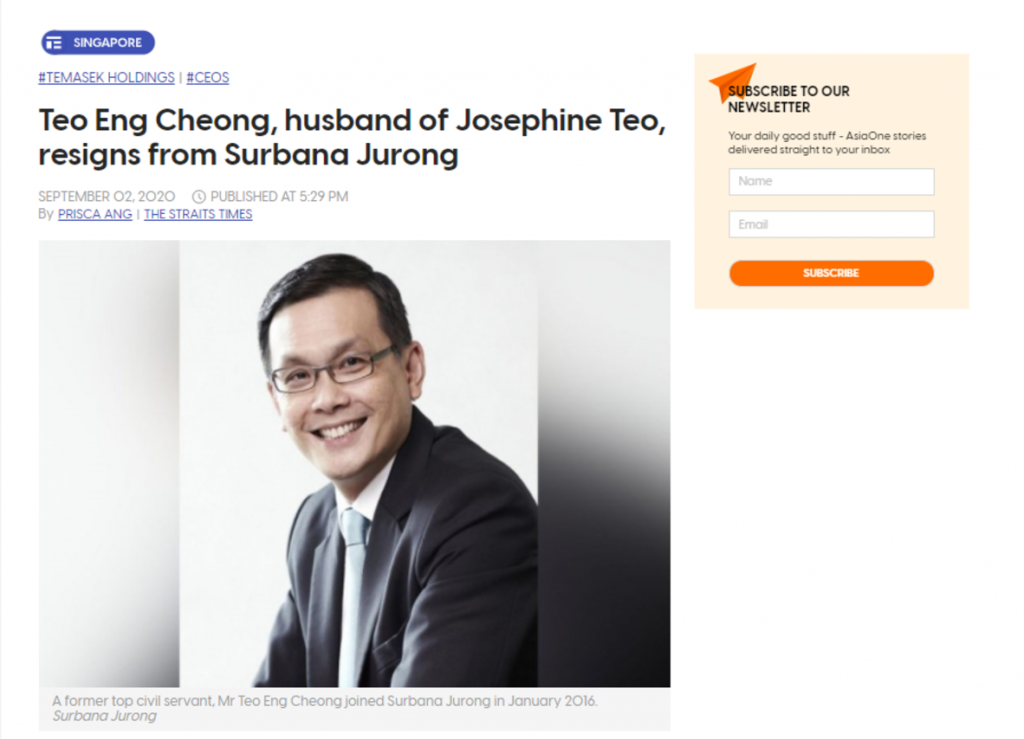
Of course, the logistics of such a register—who should be responsible for maintaining it, where it should be published, and so on—would need to be discussed.
More difficult to hash out is exactly which interests should be disclosed. Should significant shareholdings be included? Directors’ fees? What about spouses’ jobs?
Discussions about scope are unavoidable and necessary, and there’s a legitimate distinction to be drawn between matters which the public might be interested in (but don’t affect MPs’ duties), and matters in the public interest (which do, or could).
Former NMP Professor Walter Theseira indicated that he would support disclosure laws, albeit limited to information material to public decision-making.
“Privacy as a concept is different from public scrutiny, and while it is proper to scrutinise politicians’ financial interests, it is not proper to invade their privacy when it is not relevant to their public decision-making and leadership,” he said, adding that a balance had to be struck between the two.
Ms. Poa felt that disclosure standards should be pegged to an MP’s powers and duties, with political office holders being required to disclose their total personal assets on top of any directorships, shareholdings, and material interests (which would apply to all MPs, including NCMPs and NMPs).
While debates about mechanics can and should be had, these are issues of implementation rather than arguments against the principle of such a register; a question of how, rather than why. [3] Fundamentally, it’s hard to dispute the desirability of measures which aim to increase trust in government, not diminish it.

Calls for such a register are not new. The idea was first mooted by J.B Jeyaratnam in Parliament in 1997, some 23 years ago—but it never got further than a mention in Hansard.
In a heated exchange, then-Home Affairs Minister Wong Kan Seng shot down the proposal on the grounds of privacy, adequacy of the existing regime, and the government’s reputation for integrity.
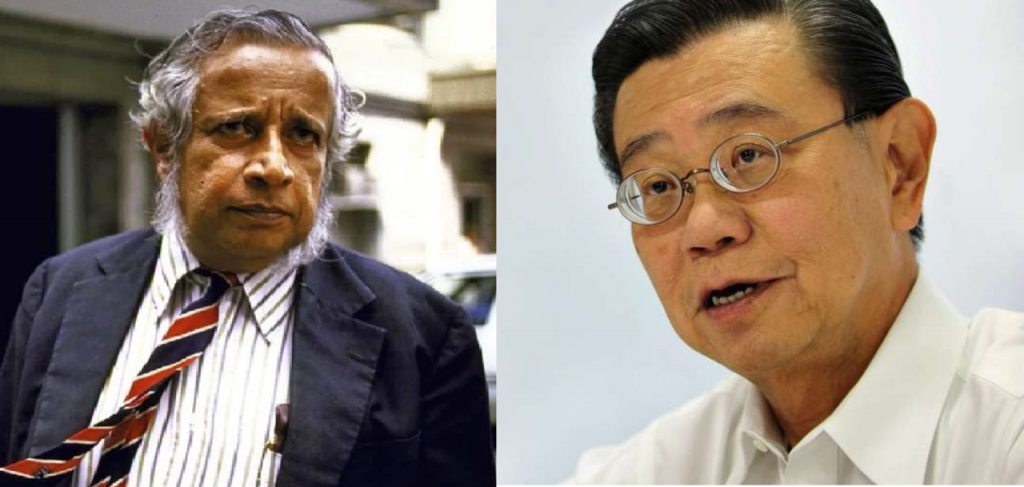
“It is completely transparent to the Prime Minister what his Ministers or office holders possess,” he said, adding, in his next breath, “but it is not within public knowledge and it is not a matter for public scrutiny,”
In her 2005 commentary, Dr. Koh proposed that Ministers’ and MPs’ codes of conduct should be made legally binding. At the very least, she suggested, “the next step could be to introduce legal provisions for a yearly declaration by ministers, all MPs, and senior civil servants. These would then be published in the Gazette.”
Similar disclosure mechanisms already exist in many other countries. Most of the G20 require some level of public disclosure of MPs’ financial interests, and several have an independent commission responsible for maintaining a register and conducting investigations.
In the UK, for example, a Register of Financial Interests is maintained by an independent Parliamentary Commissioner for Standards. Similar registers also exist in Iceland, Australia, and New Zealand.
MPs must declare their interests across nine categories, including employment and earnings, shareholdings above 15%, and family members engaged in lobbying activity. The register is updated several times a year, and past editions can be viewed all the way back to 1997.
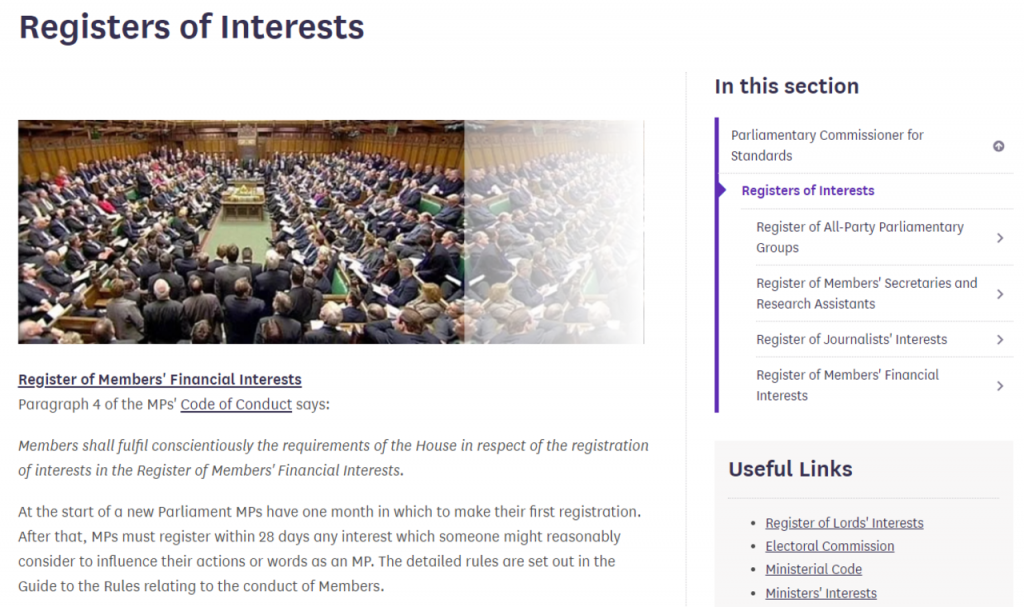
In addition to contacting individual MPs, I also tried asking the political parties in Parliament for their stances on the issue. No such luck: the PAP declined to comment, citing the existing disclosure requirements. The WP and PSP did not respond, although their GE2020 manifestos contained some proposals regarding conflicts of interest. [5]
Nonetheless, I’m hopeful that government openness to the idea has increased since 2004, when a Straits Times poll of 22 MPs found that they were split on public disclosure of directorships. [6]
Back then, around half were in favour of a publicly accessible list (with some limits), but the reasons given by those who disagreed ranged from understandable to ridiculous. MP Indranee Rajah, for example, suggested that posting MPs’ directorships on the Parliament website might be interpreted as a Parliamentary endorsement of said companies.
Encouragingly, the 14th Parliament seems readier to embrace greater transparency and civic engagement in the democratic process. In his speech at the Debate on the President’s Address, MP Murali Pillai proposed an IT system to help the public keep track of MPs’ Parliamentary performance—not to mention the government’s in-principle agreement to live-stream Parliamentary proceedings.
In fairness, it’s true that transparency alone doesn’t eliminate corruption; you need trustworthy institutions and robust compliance regimes as well for that. The Marcos’ weren’t toppled by politely asking them to declare Imelda’s Jimmy Choo collection, nor was Najib likely to volunteer that a few billion Malaysian Ringgit had mysteriously appeared in his bank account.
Disclosure, after a certain point, is always going to rely on regulation and enforcement, and bodies like the CPIB, the courts, the police, and the press are all critical in helping to uphold the rule of law.
Nonetheless, ownself-check-ownself has simply never been compatible with good governance. You just can’t square the two, and deflecting questions with questions about the point of the question only gives the impression of having something to hide. In this, a register of interests wouldn’t just help maintain public trust in the system; it would also be a gesture of good faith from a government which recognises the corrosive effect of speculation on its own legitimacy.
It’s perfectly fine for MPs to hold several directorships, own equity, or have spouses who are corporate movers-and-shakers. But as another old maxim goes: where your treasure is, there will your heart be also. When it comes to our politicians, the public should know where these lie, and not just take their word for it.
Endnotes
[1] The Parliament (Privileges, Immunities, and Powers) Act also covers attempts to bribe or influence politicians, as does the Prevention of Corruption Act. There appears to be no specific system or legislation governing lobbying, although it is indirectly regulated by laws like these, the Political Donations Act, and the Parliamentary and Presidential Elections Acts.
[2] We will update the piece if any responses are received after publication.
[3] To be clear, a register does not guarantee the prevention or elimination of conflicts of interest in politics, but it does help manage this. A study found that 46% of the top 50 public corporations in the UK have connections with a serving MP, and that these connected companies form 39% of market capitalisation. Having a register, however, enabled the researchers to gather this data in the first place.
[4] The WP’s manifesto stipulated that close relatives and current/former party colleagues should not be appointed to key positions in national institutions. Similarly, the PSP’s said that there should be no conflict of interest in key public appointments.
[5] This article (“MPs split on publishing directorships; Soh Wen Lin/The Straits Times, 8 June 2004) can only be accessed by retrieving the relevant microfilm reel at the Lee Kong Chian Reference Library.

